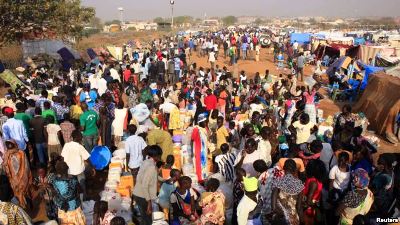Number of displaced on the rise in South Sudan: OCHA
February 1, 2014 (JUBA) – The UN Office for the Coordination of Humanitarian Affairs (OCHA) said the number of people displaced by conflict in South Sudan had risen to 740,000, with the largest increase in Unity state following ongoing fighting in its southern counties.

In its latest weekly bulletin ending 30 January, OCHA said displaced people have fled to over 100 locations, with more than 18 sites reportedly hosting over 10,000 people each. Another 123,400 people have crossed into neighbouring countries, including Uganda, Sudan and Ethiopia.
According to OCHA, the UN and its partners have so far assisted close to 300,000 displaced people, however, the response continued to be hampered by ongoing hostilities, the number and remoteness of host locations, as well as the looting and destruction of humanitarian assets.
In Unity state where fighting continues to displace communities in Leer and Koch counties, OCHA said the humanitarian response has remained confined to Bentiu, although humanitarian agencies are stockpiling supplies in preparation to mount a response in other locations when the security situation allows.
Elsewhere in South Sudan, the situation remains relatively calm, although insecurity in Jonglei was still preventing aid workers from moving freely outside the UN base.
Inadequate food supplies and the risk of malnutrition remain among the key issues facing displaced people, with security conditions affecting relief deliveries in a number of areas.
Ongoing looting has also contributed to food shortages, particularly in Upper Nile and Jonglei states, where humanitarian agencies are facing the prospect of running out of supplies.
OCHA said there is a need to improve law and order within UN bases, where some 80,000 civilians are currently seeking shelter.
The agency also expressed concerns over continued reports of clashes and subsequent population movements despite the signing of a ceasefire agreement on 23 January in the Ethiopian capital, Addis Ababa.
DIRE HUMANITARIAN SITUATION
During her visit to South Sudan, Valerie Amos, the UN humanitarian coordinator said the forced displacements had left civilians vulnerable to physical and sexual violence, targeted destruction of property, separation of families and psychological trauma.
“The current crisis comes on top of an already challenging humanitarian situation in the country, where 3.7 million people are now severely food insecure,” said Amos.
“The violence and abuses we have seen since 15 December threaten the future of this young country,” she added, reiterating the importance of reconciliation and peace in the aftermath of the six-week conflict.
Amos, who also doubles as the UN emergency coordinator, further said she was encouraged by the agreement to cease hostilities that was signed last week in Addis Ababa, Ethiopia between the South Sudanese government and its rebel delegation.
“I hope the agreement will lead to an environment where people will feel able to return to their homes and rebuild their lives,” she told reporters in Juba Wednesday.
The senior UN official also urged all parties in the conflict to respect their obligations under international humanitarian law and ensure that all civilians are protected, regardless of who they are or where they come from.
(ST)
